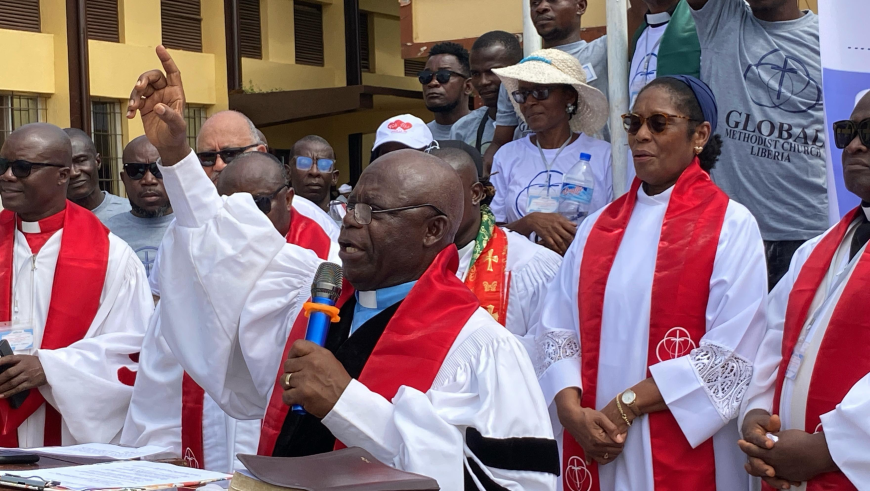Breakaway UMC churches have formed a new denomination in response to the controversy surrounding regionalization and same-sex marriage

Gbarnga, Bong County: A significant split within the United Methodist Church (UMC) in Liberia has led to the formal establishment of a new denomination under the banner "Liberia United Methodists for Biblical Christianity".
The breakaway incident occurred on Friday, February 14, 2025.
This decision was driven by disagreements over the controversial regionalization policy and the inclusion of same-sex marriage in the Methodist Church.
Making the declaratory statement at the just-ended 192nd Annual Conference held in Gbarnga, Bong County, Reverend Dr. Jerry Perry Kulah, a prominent leader of the breakaway movement, announced the formation of the New Wesleyan Methodist Denomination under the Global Methodist Church (GMC).
This narrative follows a history of tensions within the UMC concerning same-sex marriage and theological alignment.
Rev. Kulah asserted that the UMC's evolving views on marriage and ordination contradict Biblical teachings and traditional Methodist values.
The clergyman referenced the 2020/2024 Book of Discipline, which now defines marriage as a "sacred, lifelong covenant between two consenting adults" instead of strictly between a man and a woman.
"Marriage is a God-ordained union between a man and a woman, consistent with the teachings of Scripture. Homosexuality is incompatible with Christian teachings and values, leaving us no choice but to disaffiliate from the United Methodist Annual Conference," Reverend Kulah declared.
Kulah further claimed that the global UMC leadership has instructed all annual conferences worldwide to embrace full Lesbian, Gay, Bisexual Transgender Queer (LGBTQ) inclusion, which includes the ordination of openly gay and lesbian clergies and bishops.
"The highest decision-making body of the UMC has mandated every conference to comply if they wish to receive financial and other resources. This includes the ordination of LGBTQIA+ clergy and the legalization of illicit abortion," he said.
The breakaway group, "Liberia United Methodists for Biblical Christianity" (LUMBIC) has already mobilized over 100 local churches under the GMC umbrella.
Rev. Kulah expressed that they are prepared for any legal challenges regarding the church’s properties and assured that no members would be forced to leave their current places of worship.
"We are fully prepared to withstand any legal action from the UMC concerning property ownership. We will not be displaced from our churches, and we are committed to our mission as followers of Christ," Kulah affirmed.
This split occurs as the UMC continues to face deep divisions over theology, regional governance, and social issues. The Regionalization Policy, endorsed by the West African College of Bishops, allows local conferences to establish their own rules while remaining part of the global UMC.
However, the GMC leaders reject this approach, arguing that it undermines Biblical authority and paves the way for further doctrinal compromises.
Reverend Kulah: "Based on our unwavering commitment to Scripture and our loyalty to Jesus Christ, we choose to obey God rather than an institution. We will not compromise our faith to align with the shifting ideologies of the global UMC”.
The official announcement of the Global Methodist Church in Liberia marks a historic turning point in the country’s Methodist community as the breakaway faction advances its vision for a traditionalist, Bible-centered denomination.
The United Methodist Church has a history that dates back to 1730 when John and Charles Wesley gathered a small group of students to promote the Methodist movement.
The current denomination was officially established in 1968 in Dallas, Texas, through the merger of the Methodist Church and the Evangelical United Brethren Church.
This denomination traces its roots to the revival movement led by John and Charles Wesley in England, as well as the Great Awakening in the United States. Before the 1968 merger, various Methodist denominations had already merged to form what is now known as the United Methodist Church.
The UMC in Liberia began in 1821, initiated by free blacks and formerly enslaved individuals returning to Africa from the United States.
Among its early members was Joseph Jenkins Roberts, who became the first president of Liberia. The church was organized as the Annual Conference of the United Methodist Church, based in the Liberia Area.
An Annual Conference serves as a primary unit, through which the church operates in a specific area and represents the denomination, providing a platform for leadership and decision-making.
The Liberia Annual Conference of the United Methodist Church was established one hundred eighty-one years ago and boasts a long history of faithful service to the Liberian people.
The Liberia Annual Conference consists of 20 districts. Each district is smaller than an Annual Conference and contains between 10-40 churches, depending on the geographical area.
The 20 districts making up the Liberia Annual Conference are located throughout Liberia, with a concentration in the west, central, and southeastern regions. In total, the Liberia Annual Conference is composed of approximately five hundred local churches.
The 20 districts of the Annual Conference include: Monrovia District, St. Paul River District, Kakata-Farmington River District, Weala District, St. John River District, Grand Bassa District, Rivercess District, Gbarnga District, Jorquelleh District, and the Lofa River District.
Others are; Gompa District, Cape Palmas District, Garraway District, Kru Coast District, Nana Kru District, Barrabo District, Sinoe District, Morweh District, Tappita District, and the Kokoyah District.
This structure allows the Liberia Annual Conference to effectively serve the diverse needs of its communities.
What's Your Reaction?






































































